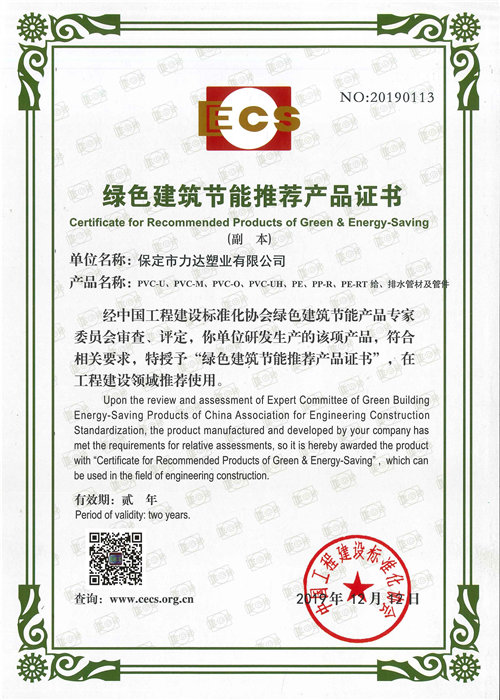sep . 22, 2024 04:25 Back to list
cpvc chemical pipe
Understanding CPVC Chemical Pipes Properties, Applications, and Advantages
Chlorinated Polyvinyl Chloride (CPVC) is a thermoplastic polymer widely used in the production of chemical pipes. Its unique properties make it an ideal choice for various industrial applications, particularly where chemical resistance and temperature tolerance are critical factors. This article explores the characteristics, applications, and advantages of CPVC chemical pipes.
Properties of CPVC Pipes
One of the standout features of CPVC is its exceptional resistance to a broad range of chemicals. This makes CPVC pipes suitable for handling aggressive substances, including acids, alkalis, and certain solvents. Unlike traditional PVC, which can deteriorate when exposed to heat and harsh chemicals, CPVC maintains its integrity across a wider temperature range, typically from 32°F to 212°F (0°C to 100°C). This thermal stability is particularly valuable in industries that require hot water transfer and other high-temperature applications.
Another significant advantage of CPVC pipes is their low thermal conductivity. This property is essential for reducing heat loss in hot water applications. Additionally, CPVC's smooth internal surface minimizes friction, promoting efficient fluid flow and reducing energy costs.
Applications of CPVC Chemical Pipes
CPVC chemical pipes are employed in various sectors, including chemical processing, plumbing, and construction. In chemical processing, they are used to transport corrosive materials safely within plants. The pharmaceutical industry also benefits from CPVC’s ability to withstand harsh cleaning solvents and sterilization processes.
cpvc chemical pipe

In plumbing applications, CPVC is often used for hot and cold water distribution systems. Its resistance to scale and corrosion enhances the longevity of plumbing systems, leading to reduced maintenance costs over time. Additionally, CPVC is commonly used in fire sprinkler systems due to its ability to withstand high temperatures without degrading.
Advantages of Using CPVC Pipes
One of the most significant advantages of CPVC pipes is their ease of installation. CPVC piping systems can be installed with solvent welding, which creates strong joints quickly and efficiently. This ease of installation can lead to lower labor costs and shorter project timelines.
Moreover, CPVC pipes are lightweight compared to metal alternatives like steel or copper, making them easier to transport and install. This characteristic not only reduces labor costs but also minimizes the environmental impact associated with transportation and installation.
CPVC is also non-toxic and doesn't leach harmful chemicals into liquids, making it safe for drinking water applications. This aligns well with environmental standards and health regulations, further enhancing its appeal in construction and plumbing projects.
Conclusion
In summary, CPVC chemical pipes offer a robust solution for industries requiring chemical resistance and temperature stability. Their unique properties, versatile applications, and installation advantages position them as a preferred choice in modern piping solutions. As industries continue to evolve and demand safer, more efficient alternatives, CPVC pipes are likely to play a critical role in future innovations in chemical transportation and plumbing.
-
Premium PVC Soft Sheets: Clear, Flexible & Durable
NewsAug.12,2025
-
Premium PVC Round Rods: Durable, Chemical Resistant, Easy to Machine
NewsAug.11,2025
-
PP U-channel: Chemical-Resistant, Lightweight & Durable
NewsAug.10,2025
-
Transparent PVC Pipe: Clear Flexible Tubing for Fluids
NewsAug.09,2025
-
Durable PP Rigid Sheet: Versatile & High-Quality Plastic Panels
NewsAug.08,2025
-
Premium Glossy PP Rigid Sheet – Durable & Versatile
NewsAug.07,2025

